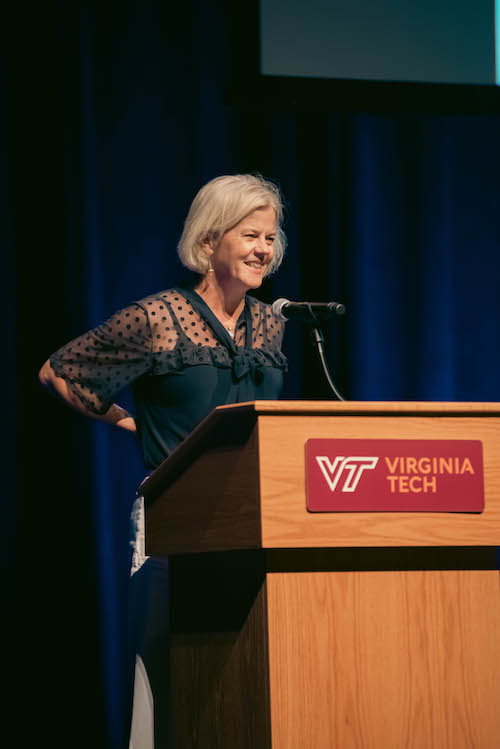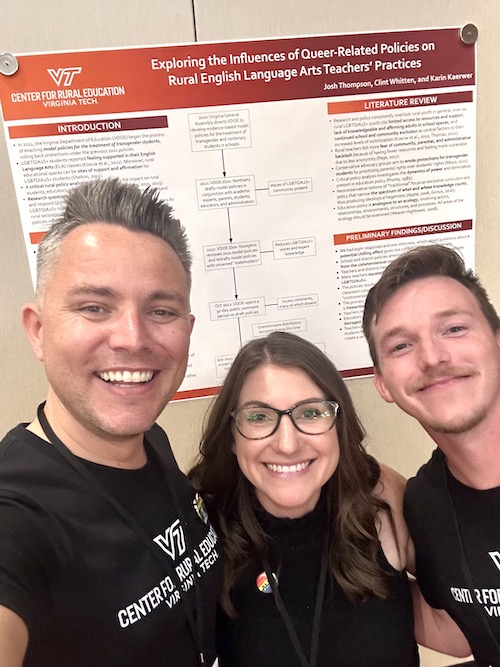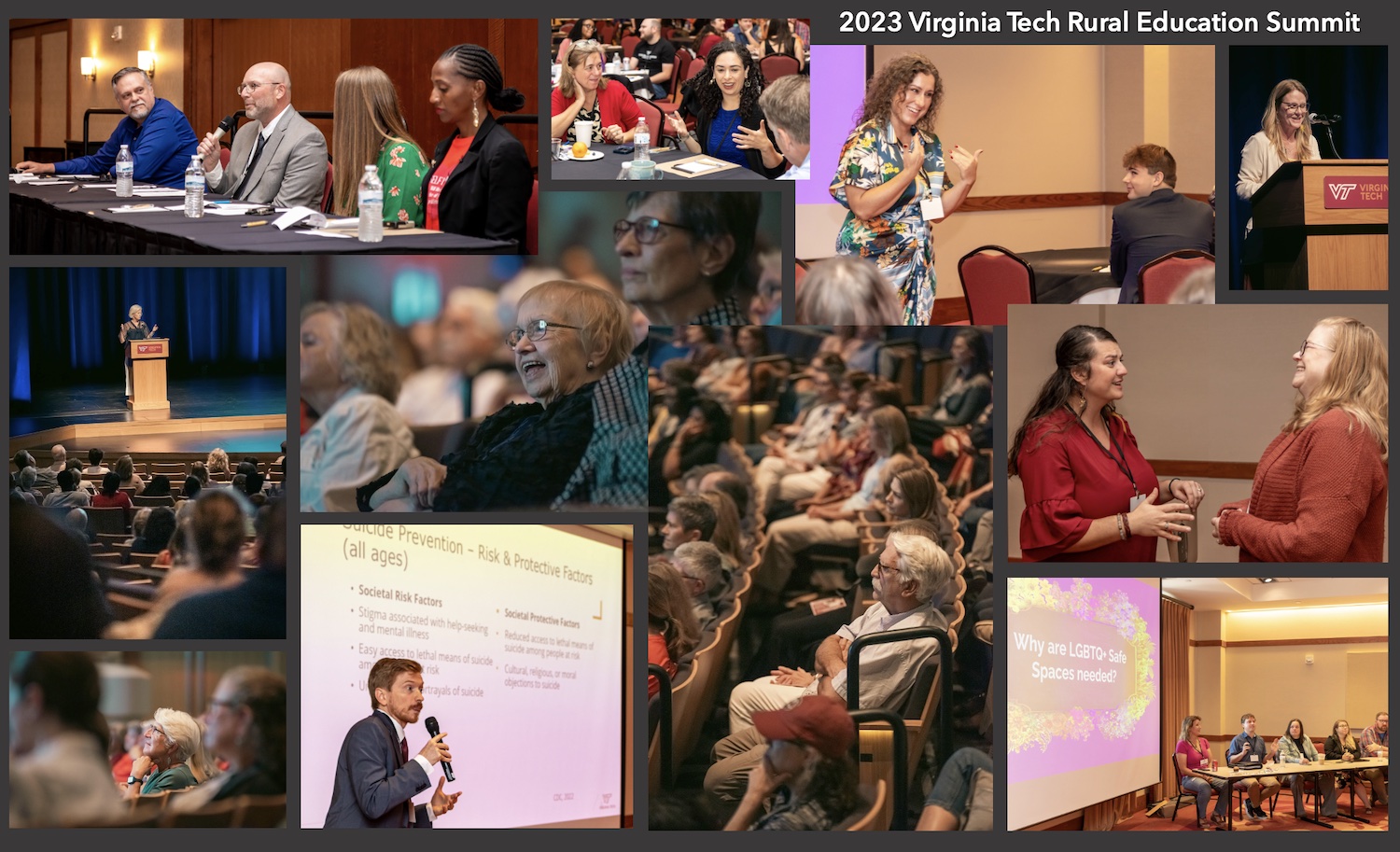By Josh Thompson
September 12, 2023
Photos taken by: Diane Deffenbaugh, VT Office of Engagement
I started my PhD journey at Virginia Tech last year in August 2022. As a three-time Hokie already (BA in English; MAEd in Curriculum and Instruction, English Education; and MA in English) and longtime Blacksburg resident, I felt incredibly comfortable: I knew faculty, staff, and students across the university; I already had my favorite hangouts and places to study; and the town felt like home because it was home. At the time, I was entering my twelfth year as an educator and had a general idea of my research interests, but it wasn’t until I attended last year’s Rural Education Summit that I knew exactly where I was meant to be and what I was meant to do.
During that summit, I listened to professors, superintendents, teachers, and community leaders discuss rural resourcefulness, rural cultural wealth, rural resilience, and educational equity in rural communities. I met others from rural areas—people who had both similar and different backgrounds to mine. My ears tuned in to the familiar drawls and colloquialisms, and my soul felt content riding the familiar linguistic pitches, rises, and falls I grew up with. For what might have been the first time, I heard my home county—Patrick—brought up in academic discussion by someone other than me.
That day, I felt emotionally, intellectually, and spiritually stimulated in ways I had not experienced in a long time. And I was shocked.
To understand my surprise, I need to take you back in time. I grew up at the foot of the Blue Ridge Mountains in Southwestern Virginia. I spent countless days in the woods and fields around my house. I helped my great-aunt and -uncle tend to the expansive gardens in the bottomland by the Ararat River (what we call “The Bottom”) on the same land my granny grew up on with her three sisters and two brothers. I was riding four-wheelers before I started kindergarten. And one of my favorite things to do was spend hours stringin’ bushels and bushels of beans with my granny and her siblings and in-laws, listening to their stories from before I was born punctuated by the snaps and pings as we dropped bean after bean into five-gallon buckets. To this day, stringin’ beans is a form of therapy for me.

Author Beth Macy was our community keynote speaker. Photo credit: Diane Deffenbaugh
Fast forward to my time in high school classrooms: I taught in rural and rural-serving public schools. I supported students who had stories like mine. I advocated for equitable practices to best serve them, and I worked hard to make sure that they saw themselves represented in asset-based ways.
So when I realized that rural education was a thriving field of research, I was simultaneously thrilled that I could become part of this community and amazed that I had not realized that it was a possibility to begin with. I spent the rest of that academic year reading rural education scholarship, learning about relevant theories and concepts, conducting research, and becoming more involved with a cohort of emerging rural education scholars.
I came to this year’s summit more knowledgeable and connected, thanks largely in part to my work as a graduate assistant in the Center for Rural Education. In addition to helping prepare for and run the summit, I once again joined a group of rural educators and community leaders as we discussed and learned about community health and wellness in rural areas. Topics spanned from trauma-informed practices for rural students, teaching rural multilingual learners, and healthcare in rural communities to community educational practices supporting rural LGBTQIA2S+ students, professional development for rural educators, and collective action for sustainability in rural areas.
I also had the opportunity to participate in the summit this year as a rural education scholar, presenting research I am conducting with PhD candidates and fellow students Clint Whitten and Karin Kaerwear on the influences LGBTQIA2S+-focused educational policies have on rural secondary English Language Arts educators. Once again, I witnessed the strength and promise of rural people and rural education. Once again, I felt right at home.
Now, after attending two summits, I realize the importance of an event like the Rural Education Summit for graduate students like me. I have learned more about the field, I have discovered new possibilities for rural people and communities, and I have been inspired. Importantly, I have also received incredible mentorship through interactions with rural education scholars and leaders. This year’s summit focused on community health and wellness, and it has also played a significant role in my own wellness as a rural person and PhD student. It is something I hope all students in rural education have the chance to experience. I encourage students to attend and present at future summits, and I encourage professors to bring their students with them next time. It is an opportunity to not only learn and be in community with other rural educators and leaders but also to give back to the places and people that raised us.

Josh, Karin, and Clint presenting their research. Photo credit: Josh Thompson
A product of rural public schools, Josh Thompson is a queer Appalachian educator and scholar, three-time graduate of Virginia Tech, current PhD student in the English education program, and graduate assistant for the Center for Rural Education. His research and scholarship center on rural education, adolescent literacy, and the experiences, needs, hopes, and dreams of rural queer youth. His articles about reading and teaching have appeared in the English Journal and Virginia English Journal, and he chairs the secondary section steering committee for the National Council of Teachers of English.



